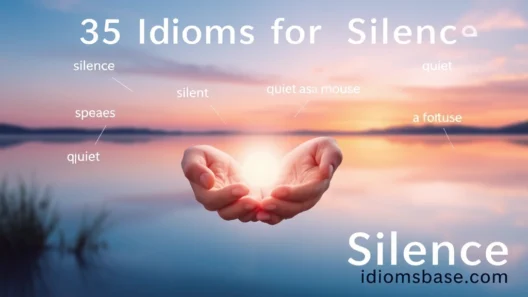Hey there, language lovers and word enthusiasts! Have you ever wanted to sound a bit more… well, brilliant? Like someone who always has the perfect phrase ready, showcasing their sharp mind without explicitly saying, "I'm smart"? You're in luck! English is absolutely brimming with fantastic idioms that can help you do just that.
Idioms are those quirky phrases where the meaning isn't obvious from the individual words. They're like secret codes that native speakers understand, and mastering them can truly elevate your communication. They add color, nuance, and a touch of sophistication to your speech and writing. Ready to dive into a world of clever expressions? Let's explore 35 incredible idioms that subtly signal intelligence, quick wit, and deep understanding!
Unlocking Your Inner Genius: 35 Idioms for "Smart"
Let's explore some of the most insightful and illustrative idioms that describe intelligence, quick thinking, and wisdom. You'll be surprised how often you can weave these into your everyday conversations!
Idioms for Being Intellectually Sharp
These idioms highlight a person's keen intellect, their ability to grasp complex ideas, and their overall mental prowess.
- A sharp cookie: This idiom describes someone who is very intelligent and quick-witted.
- Example: "Don't try to fool Sarah; she's a sharp cookie and will see right through your plan."
- Bright as a button: Meaning extremely intelligent and quick to understand.
- Example: "Even at her age, my grandmother is bright as a button and remembers everything."
- Quick on the uptake: This refers to someone who understands things quickly and easily.
- Example: "Our new intern is really quick on the uptake; he learned the system in no time."
- Have a good head on one's shoulders: To be sensible, intelligent, and able to make good decisions.
- Example: "She has a good head on her shoulders, so I trust her judgment completely."
- Not just a pretty face: This implies that someone is not only attractive but also intelligent.
- Example: "He's not just a pretty face; he's also a brilliant scientist."
- A brainbox: An informal term for a very intelligent person.
- Example: "My brother was always the brainbox of the family, excelling in every subject."
- Have all one's marbles: To be mentally sound and rational. Often used in the negative to describe someone who isn't.
- Example: "Sometimes I wonder if he has all his marbles, given some of the decisions he makes."
- Know one's stuff: To be very knowledgeable and skilled in a particular area.
- Example: "Our IT guy really knows his stuff; he fixed the problem in minutes."
- A walking encyclopedia: Someone who knows a vast amount of information about many subjects.
- Example: "Ask John anything about history; he's a walking encyclopedia."
- Have a mind like a steel trap: To have an excellent memory and be able to remember details accurately.
- Example: "You only need to tell him something once; he has a mind like a steel trap."
- On the ball: Alert, knowledgeable, and competent.
- Example: "Our project manager is always on the ball, anticipating problems before they arise."
- Out of the box thinker: Someone who thinks creatively and unconventionally.
- Example: "We need an out-of-the-box thinker to solve this complex problem."
- A shrewd operator: Someone who is clever and good at making practical decisions, especially in business.
- Example: "She's a shrewd operator; she always finds the best deals."
- As keen as mustard: Very enthusiastic and intelligent.
- Example: "The new students are as keen as mustard, eager to learn everything."
- Have one's wits about one: To be alert and able to think quickly in a difficult situation.
- Example: "It was a dangerous situation, but she had her wits about her and found a way out."
- A bright spark: A clever and innovative person, often used informally.
- Example: "Who was the bright spark who came up with this brilliant idea?"
Idioms for Wisdom and Experience
These idioms often suggest a deeper, more profound kind of intelligence that comes with experience and good judgment.

- Wise beyond one's years: To be very mature and sensible even at a young age.
- Example: "Despite being only twenty, she's wise beyond her years."
- An old head on young shoulders: Similar to "wise beyond one's years," indicating maturity and good judgment in a young person.
- Example: "He might be young, but he has an old head on young shoulders when it comes to business."
- Have been around the block: To have a lot of experience, especially with life's challenges.
- Example: "Don't try to pull a fast one on him; he's been around the block a few times."
- Know the ropes: To be familiar with how things are done in a particular place or situation.
- Example: "Once you know the ropes, this job is actually quite easy."
- Have one's finger on the pulse: To be aware of the latest developments and trends.
- Example: "As a journalist, it's important to have your finger on the pulse of current events."
- See the big picture: To understand the overall situation or a problem rather than just the details.
- Example: "He tends to focus on small details, but sometimes you need to step back and see the big picture."
- Read between the lines: To understand the unstated meaning or hidden implications.
- Example: "Her email seemed polite, but if you read between the lines, you could tell she was annoyed."
- A seasoned professional: Someone with extensive experience and skill in their field.
- Example: "We hired a seasoned professional to lead the new project."
- Have foresight: The ability to predict what will happen or be needed in the future.
- Example: "Her decision to invest early showed remarkable foresight."
Idioms for Quick Wit and Cleverness
These idioms focus on the ability to think quickly, respond cleverly, and solve problems efficiently.
- Quick-witted: Able to think and respond quickly and intelligently.
- Example: "His quick-witted responses always make the audience laugh."
- A quick study: Someone who learns new things rapidly and easily.
- Example: "She's a quick study, so I'm sure she'll master this software in no time."
- Have a trick up one's sleeve: To have a secret plan or strategy that can be used if needed.
- Example: "I'm not worried; I'm sure the manager has a trick up her sleeve."
- Think on one's feet: To be able to think quickly and make decisions in a spontaneous situation.
- Example: "The speaker had to think on his feet when the projector stopped working."
- Have a good head for figures: To be good at mathematics and calculations.
- Example: "You should ask Sarah to check the budget; she has a good head for figures."
- Have a natural flair for something: To have a natural ability or talent for a particular activity.
- Example: "He has a natural flair for languages; he picks them up so quickly."
- Nobody's fool: Someone who is intelligent and not easily deceived.
- Example: "You won't trick him; he's nobody's fool."
- Have a lightbulb moment: A sudden realization or understanding of something.
- Example: "After struggling with the problem for hours, I finally had a lightbulb moment."
- To be a whiz (at something): To be extremely good or skillful at something.
- Example: "My nephew is a whiz at coding; he can build apps in no time."
- To have one's head screwed on right: To be sensible and intelligent.
- Example: "She's got her head screwed on right, so I trust her advice."
Key Takeaways
- Idioms add flavor: They make your English more natural, engaging, and sophisticated.
- Subtle signals: Using these idioms allows you to describe intelligence without being boastful.
- Practice makes perfect: The best way to master idioms is to use them in context.
- Variety is key: There are many ways to describe intelligence, from quick wit to deep wisdom.
Frequently Asked Questions (FAQs)
Q1: Why are idioms important for English learners?

Idioms are crucial because they are a fundamental part of everyday English conversation and media. Understanding them helps you comprehend native speakers better, and using them makes your English sound more natural and fluent. They add richness and nuance that literal language often lacks.
Q2: How can I remember so many idioms?
The best way to remember idioms is through regular exposure and active practice. Try to:
- Contextualize: Learn idioms within sentences or short stories, not just as isolated phrases.
- Visualize: Create a mental image for each idiom to help it stick.
- Categorize: Group idioms by theme (like "smart" or "happy") to make them easier to recall.
- Use them: Actively try to incorporate new idioms into your conversations or writing.
- Review regularly: Go back and review idioms you've learned to reinforce your memory.
Q3: Can I use these idioms in formal writing?
It depends on the idiom and the context. Some idioms, like "a sharp cookie" or "a brainbox," are quite informal and best suited for casual conversation or creative writing. Others, like "know one's stuff" or "a seasoned professional," can be used in slightly more formal contexts, especially if you're aiming for a friendly or engaging tone. Always consider your audience and the purpose of your writing before using an idiom. When in doubt, err on the side of caution for very formal documents.
Q4: Are there any idioms for "smart" that have a negative connotation?
Yes, sometimes idioms can be used sarcastically or to imply a different kind of "smart." For example, someone might say "Oh, a real smart aleck!" to describe someone who is annoyingly clever or tries to show off their intelligence. Another phrase, "too clever by half," suggests someone who is overly ingenious or tries to be too cunning, often with negative results.
Q5: What's the difference between an idiom and a proverb?
While both are common phrases, they serve different purposes. An idiom is a phrase where the meaning cannot be deduced from the literal meaning of its words (e.g., "kick the bucket" means to die). A proverb is a short, well-known saying that expresses a general truth or piece of advice (e.g., "Actions speak louder than words"). Idioms are about expression; proverbs are about wisdom.
Conclusion
Wow, that was a whirlwind tour through 35 fantastic idioms that can help you sound incredibly smart and articulate! From being "bright as a button" to having "a mind like a steel trap," these expressions offer a colorful way to describe intelligence, wisdom, and quick thinking.
Don't just read them; try them out! The more you integrate these idioms into your vocabulary, the more natural and confident your English will become. So, which one will you try first? Are you a "quick study" ready to master them all, or will you "read between the lines" to find your favorites? Keep practicing, and soon you'll be speaking English with the flair of a true "seasoned professional"!







